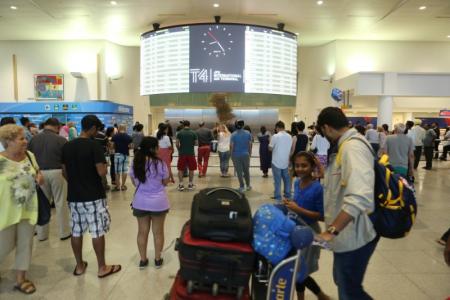
By Yeganeh Torbati and Mica Rosenberg
WASHINGTON/NEW YORK (Reuters) – U.S. President Donald Trump’s administration reversed a decision late on Thursday as its revised travel ban took effect and said fiancés would be considered close family members and therefore allowed to travel to the United States.
The U.S. State Department concluded “upon further review, fiancés will now be included as close family members,” said a State Department official who requested anonymity.
The Trump administration had previously decided on the basis of its interpretation of a U.S. Supreme Court ruling that grandparents, grandchildren and fiancés travelling from Iran, Libya, Somalia, Sudan, Syria and Yemen would be barred from obtaining visas while the ban was in place.
The 90-day ban took effect at 8 p.m. EDT (0000 GMT Friday) along with a 120-day ban on all refugees.
On Monday, the Supreme Court revived parts of Trump’s travel ban on people from six Muslim-majority countries, narrowing the scope of lower court rulings that had blocked parts of a March 6 executive order and allowing his temporary ban to go into effect for people with no strong ties to the United States.
A spokesman for the Department of Homeland Security, who requested anonymity, said it would be updating its guidance to state that fiancés will not be barred from obtaining visas while the ban is in place.
The Supreme Court exempted from the ban travellers and refugees with a “bona fide relationship” with a person or entity in the United States. As an example, the court said those with a “close familial relationship” with someone in the United States would be covered.
On Thursday evening, the state of Hawaii asked a federal judge in Honolulu to determine whether the Trump administration had interpreted the court’s decision too narrowly.
Hawaii said in a court filing that the U.S. government intended to violate the Supreme Court’s instructions by improperly excluding from the United States people who actually have a close family relationship to U.S. persons, echoing criticism from immigrant and refugee groups.
Hawaii called the refusal to recognise grandparents and other relatives as an acceptable family relationship “a plain violation of the Supreme Court’s command.”
Hawaii’s Attorney General Doug Chin asked U.S. District Judge Derrick Watson in Honolulu, who blocked Trump’s travel ban in March, to issue an order “as soon as possible” clarifying how the Supreme Court’s ruling should be interpreted.
Karen Tumlin, legal director of the National Immigration Law Center, said the administration’s guidance “would slam the door shut on so many who have waited for months or years to be reunited with their families.”
Asked how barring grandparents or grandchildren makes the United States safer, a senior U.S. official did not directly answer, but instead pointed to Trump’s guidance to pause “certain travel while we review our security posture.”
The U.S. government expects “things to run smoothly” and “business as usual” at U.S. ports of entry, another senior U.S. official told reporters.
The administration said that refugees who have agreements with resettlement agencies but not close family in the United States would not be exempted from the ban, likely sharply limiting the number of refugees allowed entry in coming months.
Hawaii said in its court filing that it was “preposterous” to not consider a formal link with a resettlement agency a qualifying relationship. Refugee resettlement agencies had expected that their formal links with would-be refugees would qualify as “bona fide.”
The administration’s decision likely means that few refugees beyond a 50,000-cap set by Trump would be allowed into the country this year. A U.S. official said that as of Wednesday evening, 49,009 refugees had been allowed into the country this fiscal year. The State Department said refugees scheduled to arrive through July 6 could still enter.
Trump first announced a temporary travel ban on Jan. 27, calling it a counterterrorism measure to allow time to develop better security vetting. The order caused chaos at airports, as officials scrambled to enforce it before being blocked by courts. Opponents argued that the measure discriminated against Muslims and that there was no security rationale for it.
A revised version of the ban was also halted by courts.
The State Department guidance, distributed to all U.S. diplomatic posts on Wednesday evening and seen by Reuters, fleshed out the Supreme Court’s ruling about people who have a “bona fide” relationship with an individual or entity in the United States.
It defined a close familial relationship as being a parent, spouse, child, adult son or daughter, son-in-law, daughter-in-law or sibling, including step-siblings and other step-family relations.
A department cable said grandparents, grandchildren, aunts, uncles, nieces, nephews, cousins, brothers-in-law and sisters-in-law, fiancés, “and any other ‘extended’ family members” are not considered close family.
The guidelines also said that workers with offers of employment from a company in the United States or a lecturer addressing U.S. audiences would be exempt from the ban, but that arrangements such as a hotel reservation would not be considered bona fide relationships.
(Reporting by Yeganeh Torbati and Mica Rosenberg; Additional reporting by Arshad Mohammed, Lawrence Hurley and Susan Heavey in Washington and Gabriella Borter in New York; writing by Amanda Becker; Editing by Jonathan Oatis and Grant McCool)